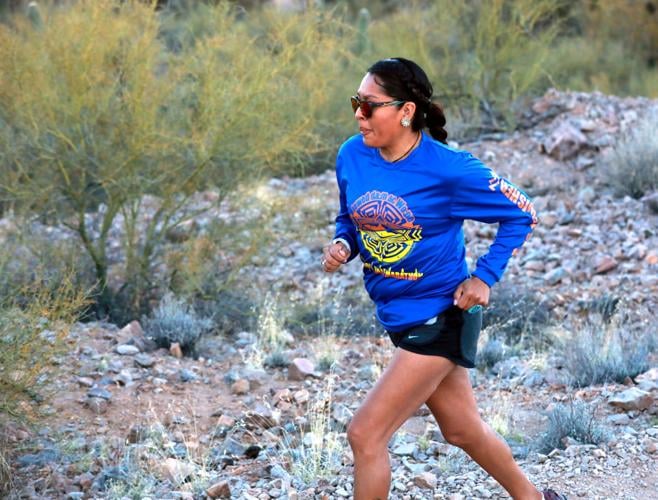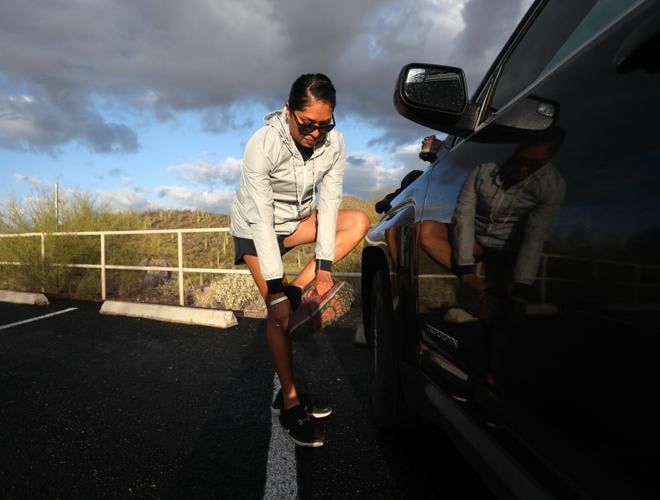The Tohono O’odham runners are one with Mother Earth as their feet pound over desert trails, dirt roads or pavement. Running is a tradition that dates back centuries to their ancestors, the Hohokam. Runners would carry messages from village to village spreading news over expansive lands.
Running for the Tohono O’odham is tradition. Running is cultural. Running is spiritual.
Most recent, four runners led first lady Jill Biden’s motorcade on the San Xavier District, south of Tucson. It is one of 11 districts that make up the Tohono O’odham Nation, which is about the size of Connecticut. Sells is the capital of the nation and is located 60 miles southwest of Tucson.
During the first lady’s visit last month as part of a national effort to reduce cancer deaths and reach underserved communities, the runners carried staffs adorned with eagle feathers and ribbons, and blessed and cleared the path for Biden, the nation’s distinguished guest.
One of those runners was Eric Havier Jr., 14, a freshman and football player at Desert View High School.
“It was nice welcoming her, and it was really a nice run. It was a short run on a sunny afternoon,” said the teen who began running at age 5. “My parents encouraged me to go down the traditional path of running. I like running. It feels good and it cleanses your mind,” said the teen, explaining that he prays for family and members of the community while he runs throughout the district and other parts of the reservation.
Havier said running is personal and a decision for each individual to make. He said he is encouraging his 8-year-old brother to become a runner. The longest event the teen has participated in is the annual Unity Run, a weeklong run that has different routes. It can start in Mexico and head north across the international border on nation land and runners continue toward Red Rock. Participants camp out in tents and the district communities provide food and at times shelter, including a school gymnasium. Support vehicles follow the runners and hand out water, Gatorade, snacks and fruit.
Brandon Havier is Eric’s uncle, and Brandon is the run leader on the San Xavier District and organizes up to 40 running events a year, something he has done over two decades. The events include burial escort runs for funeral processions of veterans and also Memorial Day runs that are open to O’odham veterans. Runners also participate in an annual June camp, “Preparing the Eaglet to Fly”, a young man’s gathering to teach tribal culture and values. In addition to running and camping, the youth learn how to build a fire for a sweat lodge and how to hunt with a bow and arrow.
Brandon, 44, no longer runs because of complications in his legs from diabetes, but he works with the runners and recruits youth, emphasizing the need for young people to be physically active and lead healthy lifestyles to prevent diabetes, which is an epidemic on the nation. He said he enjoys seeing runners exercising and staying in shape. “Some train every evening to run marathons. Traditional running is not a dying art for us, not in this district,” said Brandon, of participants ages 5 to over 60.
“I walk and continue exercising to stay healthy. There are days I jog, and maybe there will come a day that I can run again,” Brandon said. He said he leans on his wife, Jenifer Havier, who drives Brandon to all the events and also drops off runners at the starting points for their runs.
Challenge the body
Marathon runner Marlinda Francisco works to show others what their body is capable of doing as a member of the nation’s Healthy O’odham Promotion Program, a program that teaches the risks of diabetes and the importance of nutrition and physical activity to keep it under control and lead to healthy lives.
The Navajo and Tohono O’odham woman, who was born in Tuba City and grew up in Tucson, works in Sells and coordinates running events virtually since the pandemic, but is eager to bring back in-person community events in the near future as the nation begins to slowly reopen.
Francisco began running seven years ago in Shiprock, New Mexico, on the Navajo Nation. The run was in memory of her uncle Rick Begay. “It was my first half-marathon (13.1 miles), and I dedicated it to him,” she said of the healing run, covering a few hills and gradual inclines on desert land, in which she prayed for strength. She continued participating in runs in the Tucson area, praying for herself and her family. In 2018, Francisco competed in her first marathon in Shiprock on her uncle’s anniversary of his death.
“All of this inspired me and I enjoyed coordinating runs on the Tohono O’odham Nation through the Healthy O’odham Promotion Program. We coordinated half-marathons in different communities in the Sells District and the Baboquivari District. The largest event we had was near 300 participants. We have been doing this for more than 11 years,” said Francisco.
Runners train themselves and keep fit for endurance, speed and strength. Some run on the road or on desert trails, said Francisco, who runs the Starr Pass Trailhead or on trails in Sells. “I want to help people with their well-being. I come from a family with diabetes and I have lost family members,” said Francisco. She quickly counted eight deaths, including aunts, an uncle and a grandmother.
She has three daughters who are runners and all ran cross country at Baboquivari High School. Two have graduated and one is a student and remains on the team. Her two older daughters are training for their first half-marathon in Shiprock next month.
“The physical part of training does take a lot of work, especially on your legs,” said Francisco, rattling off injuries to her hamstring, Achilles tendon and the top of her foot that sidelined her training for days on up to weeks. “Once you’re healed, you get back out there again. Now that it is hot, I start running usually before 7 in the morning three to four times a week. When I am in training for a marathon, I run 16 miles a day — one day on and one day off to rest,” she said.
“When I am running, I focus on myself and listen to my body. Running out on the Tohono O’odham Nation is a blessing because that is our way of connecting to our land. We are testing our strength and testing our body,” said Francisco. She wears a hydrovest carrying water, electrolytes, protein bars or salt sticks to prevent cramping. She has encountered hawks, javelinas, coyotes, rabbits, snakes and a Gila monster. She has been warned to be on the lookout for mountain lions.
“I believe our loved ones who have passed are watching over us and will protect us on our runs. They come in the forms of butterflies, cardinals and feathers. I always pray and thank them for running with me and watching over me,” she said.
She recently competed in a 50-kilometer race in Monument Valley on the Navajo Nation and the course was on tribal parks land covering trails, hills, sand area and a mesa. “The run started sunny with a light breeze and then over the course it became windy and there was hail and a sandstorm. After I finished running, it snowed,” she said. Runners carried extra clothing and shoes and used aid stations to change.
In November, she plans to compete in the TCS New York City Marathon. “I am going to challenge myself a little more,” she said. “If I get selected, it will be my second major marathon. Last year, I ran the Bank of America Chicago Marathon. There were thousands of runners. I did not place but I finished under 5 hours. I pulled a hamstring about three weeks before the event, but I was able to run.”
Holistic approach in running
Anthony Francisco started his running journey when he was 8, while a student at the now Indian Oasis Elementary Primary School in Sells. He participated in running events organized during holidays in the Baboquivari Unified School District. “When I first started running, it was purely recreational. I really enjoyed it and it made me feel good,” said Francisco, 42, a state champion and an All-American runner when he attended Sunnyside High School in the 1990s.
As Francisco grew older, he learned more about the cultural connection to running for the O’odham and he connected with a spiritual feeling that flowed from within and grounded him. “Our culture and spirituality is all intertwined. Runners bless the path and clear the way. It took me until I became an adult to get more in tune with that aspect of running. It is the way we pray and honor the land and others,” he said, explaining he was not involved in cultural or spiritual runs when he was young because he was busy competing to be a top distance runner at state track meets.
“Spiritual runs have helped young people in our community. It is a holistic approach that makes runners understand who they are as an O’odham,” said Francisco, cross country head coach for the Tohono O’odham Community College in Sells. Before the COVID-19 pandemic, the head coach worked with youth and hosted races at the college for runners to give back to the community.
“We do want to host running events again, and it will happen in time. People have gone through so much during these times of COVID. Our college and our dorms closed. A lot of runners had to find places to stay in Tucson, but we do expect our dorms to open this fall semester,” said Francisco, explaining that some of the college runners are students from tribes across the United States. Once the nation opens up, Francisco plans to host community runs and marathons.
“Running has always been a balance for me,” said Francisco, who runs on desert trails or dirt roads throughout the nation and competes in running events across the state. Running saved his inner self and brought him peace after the suicides of his best friend and then his uncle more than two decades ago. He ran away the anxiety and stress over dirt trails near his grandmother’s house in Comobabi, 20 miles north of Sells.
Feeling sweat and a breeze on his face under a sunny sky makes him feel good. He said running nourishes his spirit and he will continue running until the day he dies.
Marlinda Francisco, a Tohono O'odham and Navajo runner, works with Healthy O'odham Promotion Program in Sells to promote diabetes awareness and prevention. She participated in her first marathon seven years ago to honor her uncle and continues to run in events across the country representing Indigenous women and the Native American community.






